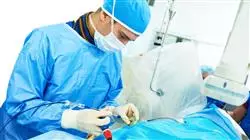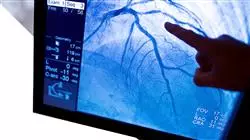University certificate
The world's largest faculty of medicine”
Introduction to the Program
A comprehensive program to learn the latest news about Acute Coronary Syndrome from Cardiology experts and with the support of the best online university in the world"

Although the number of deaths related to Acute Coronary Syndrome (ACS) has been decreasing in recent decades, it is still one of the leading causes of death in the world, especially in developed countries. These figures are concerning for cardiology specialists, not only because of its seriousness, but also due to the fact that their responsibility in the correct diagnosis and treatment of this cardiac disease is fundamental to saving lives.
For this reason, the academic demand in the field of cardiac pathologies, especially in relation to ACS, is increasing. To answer this question, TECH has launched this specialization in Acute Coronary Syndrome, directed and designed by the best cardiology experts. This program will provide you with a holistic approach to the problem, through the experience of specialists who work on this issue on a daily basis. A comprehensive program created based on the latest developments in the field that will provide students with the necessary theoretical and practical information that will be useful in patient management in their own practice.
A 100% online program where students will be able to organize their own academic calendar, as the entire syllabus will be available from the very first day on Virtual classroom. In addition, complementary material will be available in the form of videos made by the teachers, dynamic summaries of each unit, real clinical cases and research articles with which to continue studying, in-depth, each of the proposed topics. Finally, specialists will have the support of the teaching staff and will be able to request individualized tutoring to resolve any questions or doubts that may arise during the academic experience.
With this program you will be able to put into practice the latest diagnostic and therapeutic developments when treating patients with ACS"
This Professional master’s degree in Acute Coronary Syndrome contains the most complete and up-to-date scientific program on the market. The most important features include:
- The development of practical cases presented by experts in Cardiology
- The graphic, schematic, and practical contents with which they are created, provide scientific and practical information on the disciplines that are essential for professional practice
- Practical exercises where self-assessment can be used to improve learning
- Its special emphasis on innovative methodologies
- Theoretical lessons, questions to the expert, debate forums on controversial topics, and individual reflection assignments
- Content that is accessible from any fixed or portable device with an Internet connection
This Professional master’s degree will provide you with the most up-to-date criteria in the clinical management of patients with ACS and how to adequately address the differential diagnosis of chest pain in the Emergency Department"
The program’s teaching staff includes professionals from sector who contribute their work experience to this educational program, as well as renowned specialists from leading societies and prestigious universities.
Its multimedia content, developed with the latest educational technology, will provide the professional with situated and contextual learning, i.e., a simulated environment that will provide an immersive education programmed to learn in real situations.
The design of this program focuses on Problem-Based Learning, by means of which the professionals must try to solve the different professional practice situations that are presented throughout the program. For this purpose, the student will be assisted by an innovative interactive video system created by renowned experts.
You will delve into the different electrocardiographic manifestations of ST-segment elevation ACS"

The Virtual Classroom is available 24 hours a day so that you can access it whenever you need and from any electronic device"
Why study at TECH?
TECH is the world’s largest online university. With an impressive catalog of more than 14,000 university programs available in 11 languages, it is positioned as a leader in employability, with a 99% job placement rate. In addition, it relies on an enormous faculty of more than 6,000 professors of the highest international renown.

Study at the world's largest online university and guarantee your professional success. The future starts at TECH”
The world’s best online university according to FORBES
The prestigious Forbes magazine, specialized in business and finance, has highlighted TECH as “the world's best online university” This is what they have recently stated in an article in their digital edition in which they echo the success story of this institution, “thanks to the academic offer it provides, the selection of its teaching staff, and an innovative learning method aimed at educating the professionals of the future”
A revolutionary study method, a cutting-edge faculty and a practical focus: the key to TECH's success.
The most complete study plans on the university scene
TECH offers the most complete study plans on the university scene, with syllabuses that cover fundamental concepts and, at the same time, the main scientific advances in their specific scientific areas. In addition, these programs are continuously being updated to guarantee students the academic vanguard and the most in-demand professional skills. In this way, the university's qualifications provide its graduates with a significant advantage to propel their careers to success.
TECH offers the most comprehensive and intensive study plans on the current university scene.
A world-class teaching staff
TECH's teaching staff is made up of more than 6,000 professors with the highest international recognition. Professors, researchers and top executives of multinational companies, including Isaiah Covington, performance coach of the Boston Celtics; Magda Romanska, principal investigator at Harvard MetaLAB; Ignacio Wistumba, chairman of the department of translational molecular pathology at MD Anderson Cancer Center; and D.W. Pine, creative director of TIME magazine, among others.
Internationally renowned experts, specialized in different branches of Health, Technology, Communication and Business, form part of the TECH faculty.
A unique learning method
TECH is the first university to use Relearning in all its programs. It is the best online learning methodology, accredited with international teaching quality certifications, provided by prestigious educational agencies. In addition, this disruptive educational model is complemented with the “Case Method”, thereby setting up a unique online teaching strategy. Innovative teaching resources are also implemented, including detailed videos, infographics and interactive summaries.
TECH combines Relearning and the Case Method in all its university programs to guarantee excellent theoretical and practical learning, studying whenever and wherever you want.
The world's largest online university
TECH is the world’s largest online university. We are the largest educational institution, with the best and widest online educational catalog, one hundred percent online and covering the vast majority of areas of knowledge. We offer a large selection of our own degrees and accredited online undergraduate and postgraduate degrees. In total, more than 14,000 university degrees, in eleven different languages, make us the largest educational largest in the world.
TECH has the world's most extensive catalog of academic and official programs, available in more than 11 languages.
Google Premier Partner
The American technology giant has awarded TECH the Google Google Premier Partner badge. This award, which is only available to 3% of the world's companies, highlights the efficient, flexible and tailored experience that this university provides to students. The recognition as a Google Premier Partner not only accredits the maximum rigor, performance and investment in TECH's digital infrastructures, but also places this university as one of the world's leading technology companies.
Google has positioned TECH in the top 3% of the world's most important technology companies by awarding it its Google Premier Partner badge.
The official online university of the NBA
TECH is the official online university of the NBA. Thanks to our agreement with the biggest league in basketball, we offer our students exclusive university programs, as well as a wide variety of educational resources focused on the business of the league and other areas of the sports industry. Each program is made up of a uniquely designed syllabus and features exceptional guest hosts: professionals with a distinguished sports background who will offer their expertise on the most relevant topics.
TECH has been selected by the NBA, the world's top basketball league, as its official online university.
The top-rated university by its students
Students have positioned TECH as the world's top-rated university on the main review websites, with a highest rating of 4.9 out of 5, obtained from more than 1,000 reviews. These results consolidate TECH as the benchmark university institution at an international level, reflecting the excellence and positive impact of its educational model.” reflecting the excellence and positive impact of its educational model.”
TECH is the world’s top-rated university by its students.
Leaders in employability
TECH has managed to become the leading university in employability. 99% of its students obtain jobs in the academic field they have studied, within one year of completing any of the university's programs. A similar number achieve immediate career enhancement. All this thanks to a study methodology that bases its effectiveness on the acquisition of practical skills, which are absolutely necessary for professional development.
99% of TECH graduates find a job within a year of completing their studies.
Professional Master's Degree in Acute Coronary Syndrome
.
Acute Coronary Syndrome (ACS) is one of the most lethal pathologies in developed countries. Not surprisingly, chest pain is one of the common consultations in Emergency Departments and early diagnosis of ACS is essential to avoid complications. Therefore, this Professional Master's Degree in Acute Coronary Syndrome provides specialists with the latest advances in the management of ACS, diagnostic method, therapies and prevention, as well as a detailed review of cardiac rehabilitation programs. In fact, leading experts in Cardiology have participated in the creation of this program, so that graduates can broaden their knowledge in this field and improve their professional performance. The program has updated and high-quality theoretical and complementary material, which makes this Professional Master's Degree an excellent option for those professionals who wish to polish their skills and knowledge in the area of Cardiology.
Master the most challenging scenarios of ACS
.
TECH has created a Professional Master's Degree in Acute Coronary Syndrome led by experts in Cardiology that approaches ACS from a comprehensive perspective. This degree is based on the latest developments in the sector, providing advanced theoretical and practical knowledge that will be useful for the management of these patients in the specialist's own practice. The program is taught in a 100% online format and adapts to the student's availability, who will have access from the first day to the entire syllabus in the Virtual Campus. In addition, complementary materials are offered such as videos made by the teachers, dynamic summaries of each unit, real clinical cases and research articles to go deeper into each topic. Likewise, individualized tutorials are provided to resolve any doubts that may arise during the academic experience.







